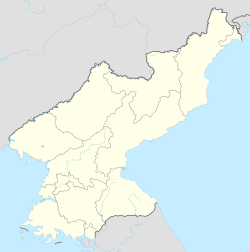Sariwon
Sariwŏn (Korean: 사리원; Korean pronunciation: [sa.ɾi.wʌn]) is a city in North Korea. It is the capital and largest city of North Hwanghae Province. PopulationThe city's population as of 2008 is 307,764. Administrative divisionsSariwŏn is divided into 31 tong (neighbourhoods) and 9 ri (villages):
HealthcareSariwŏn has the only pediatric hospital (founded by Hungarians in the 1950s) in the entire region; it serves 16 districts and 500,000 children and teens annually. IndustrySariwŏn has a Potassic/Potash Fertilizer Complex and a tractor factory. EducationSeveral institutions of higher education are based in Sariwŏn, including the Kye Ung-sang University, the Sariwŏn University of Geology, the Sariwŏn University of Medicine, the Sariwŏn University of Education no. 1 & no. 2, and the Sariwŏn Pharmaceutical College of Koryŏ. TourismThe "Sariwŏn Folklore street" was constructed during Kim Jong-il's rule. Built to display an ideal picture of ancient Korea, it includes buildings in the "historical style" and a collection of ancient Korean cannons. Many older style Korean buildings exist in the city. In 2020, Jongbangsan Hotel opened after several years of delays in construction. It has three main buildings and includes a gym and a swimming pool.[1] TransportSariwŏn is served by Sariwŏn Ch'ŏngnyŏn and several other stations on both the P'yŏngbu and Hwanghae Ch'ŏngnyŏn lines of the Korean State Railway. Sariwŏn has a trolleybus system with two Ikarus 280T articulated trolleybuses; they were converted from diesel Ikarus 280 buses due to the lack of roof equipment. Regular trolleybuses were mothballed at the depot from 2020. The service is supplemented by regular buses.[2] ClimateSariwŏn has a humid continental climate (Köppen climate classification: Dwa).
Sister citiesReferences
Further reading
External linksWikimedia Commons has media related to Sariwon. Wikivoyage has a travel guide for Sariwon. |
||||||||||||||||||||||||||||||||||||||||||||||||||||||||||||||||||||||||||||||||||||||||||||||||||||||||||||||||||||||||||||||||||||||||||||||||||||||||||||||||||||||||||||||||||||
Portal di Ensiklopedia Dunia






















